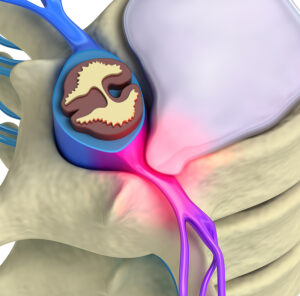Injuries affecting the back, neck, and spine can have serious consequences for the injured person and their family, as injuries of this kind have the potential to make it impossible to return to a physically demanding job and can interfere with nearly all aspects of everyday life on a long-term basis. Herniated spinal discs are one such type of back or neck injury that can result from many different sorts of accidents, including automotive and cycling crashes, as well as slips and falls.
The medical profession has a number of different terms for this condition: herniated disc, slipped disc, ruptured disc, bulging disc, and so forth; these terms are all descriptive in nature, and ultimately refer to the same medical phenomenon. The spine is made up of a series of small bones – vertebrae – that protect your spinal cord. Between each pair of vertebral bones is a spinal disc, a sort of cushion or shock absorber that allows for movement of the spinal joint. These discs are composed of two parts: the exterior cylinder made of sheets of tough, rubbery collagen fibers is called the annulus, and the inner core of mucoprotein gel is the nucleus. When one of these spinal discs becomes damaged, the jelly-like material of the nucleus is forced out through a breach or tear in the annulus.

Symptoms occur when this damaged disc irritates or presses against a nerve branching off from the spinal cord. The location of the herniated disc along the spine determines which nerve is affected, and consequently what symptoms occur and where in the body. A herniated disc in your neck may cause symptoms in your shoulder and arm, while a damaged disc in your lower back is likely to result in symptoms running down your leg. Usually only one side of the body is affected by a particular herniated disc. A sharp or burning pain shooting through the affected part of the body in response to certain types of movement is common, as is numbness or tingling in the area of the body corresponding to the affected nerve. Muscle weakness in the affected area may also result from this interference with nerve function.
As any insurance company will be quick to point out, most cases of herniated discs are not caused by injury, but by disc degeneration – the wear and tear that spinal discs suffer over time as a result of age. However, herniated discs are often asymptomatic; unless the bulging nucleus is interfering with a nerve, you may not experience any pain or other negative effects. Suffering an injury to the area, such as through a car crash or slip and fall accident, may cause further damage to the disc, squeezing more of the nucleus gel through the tear and causing it to pinch a nearby nerve. At this point, you and your attorney will have to demonstrate that, although the herniated disc was a preexisting medical condition, it became newly symptomatic as a result of the accident in a way that may never have happened had it not been for the injuries you suffered. This is a more difficult argument to prove than showing that the accident caused a brand-new injury to a spinal disc, but it is very possible with proper medical evidence.
Diagnosing a herniated disc often begins with a physical examination at the doctor’s office. Your back will be checked for areas of tenderness, and you may be asked to move in various ways to see what triggers a pain response. Tests of your reflexes, muscle strength, and sensitivity to light touches and vibration may also be used to determine what nerves are being affected. If more information is required about the affected nerves or if another condition needs to be ruled out, your doctor may order any of several imaging tests (including CT scan, MRI, or myleogram – in which dye is injected into the spinal fluid, allowing pressure on the spinal cord and nerves to become visible on X-ray) or nerve tests such as a nerve conduction study or electromyography (EMG).
As with most conditions, treatment for a herniated disc starts with the conservative care and the least invasive possible effective intervention and increases if your symptoms do not improve. In the case of disc herniation, that means you will often be advised on ways to modify your usual routine and activities to avoid the sorts of movements that cause pain, and are advised to treat pain using over-the-counter medications. Physical therapy may be prescribed in addition to this treatment. If non-prescription pain medications are not effective at managing your pain, cortisone injections in the area near the affected nerve may be prescribed. If your symptoms include muscle spasms, your doctor might include a prescription for muscle relaxers into your course of treatment. Generally, doctors try to avoid prescribing opioids for pain management in cases of herniated spinal discs, due to their side effects and the danger of addiction, but a short course of opioids may be considered if other alternatives fail to control your pain effectively.
In rare cases, herniated disc injuries will respond well to these treatments within six weeks, but more many cases that do not respond to conservative treatment may require surgical intervention. This is especially the case when symptoms include persistent numbness or muscle weakness, difficulty standing or walking, or an impairment of control over bladder and bowel functions. When surgery is indicated, it is often possible for the surgeon to remove only the damaged and protruding portion of the spinal disc, though in rare cases the entire disc must be removed. This generally necessitates the fusing together of the two adjacent vertebrae with a bone graft, though sometimes an artificial spinal disc may be implanted instead.
When seeking fair compensation from an insurance company for accident injuries including a herniated disc, one of the unfortunate obstacles that need to be overcome is that the primary symptoms involved in this type of injury are pain and numbness, which are self-reported symptoms. You know that you’re in pain, but the insurance company, whose primary interest is minimizing the amount of money it has to pay out in injury compensation, isn’t above accusing you of lying or exaggerating about your pain for profit. They may require you to undergo an examination by a doctor they choose (and pay), who will try to “catch” you saying or doing something that can be twisted against you. This is intensely frustrating for so many injured plaintiffs who would like nothing better than to stop hurting and be able to return to work. There are diagnostic imaging tests that can prove a herniated disc is causing pressure on a nerve, but these tests are often medically unnecessary as the condition is able to be diagnosed in many cases during an office visit. This is why it is so important to have an experienced personal injury attorney on your side when seeking injury compensation, who knows how to counter the strategies used by insurance companies to undermine your claim. Your lawyer can work with your medical providers to assemble the evidence proving your symptoms are real and showing how they interfere with your life, allowing you to focus on recovering from your injuries.
Herniated discs are permanent injuries to your spine. When a disc is herniated, it is similar to the jelly being squeezed or forced out of a jelly donut. Except the fluid that leaks from a herniated disc is very painful to your spine in your neck or your back. It can never be fully healed and is permanent for the rest of your life, and can lead to further health problems down the road.
Contact MyNJInjuryLawyer
If you or a loved one suffered an injury in an accident in NJ, you should contact an attorney familiar with handling these claims. An experienced NJ Injury Lawyer will know how to obtain medical records, videos, photographs, experts, locate witnesses and contact the insurance company so you can make a claim for your injuries.
My NJ Injury Lawyer Howard P. Lesnik, Esq. offers complimentary strategy sessions to address any issue or questions you may have for your injury claim in NJ.
Please contact NJ Injury Lawyer Howard Lesnik, Esq., immediately if you were involved in an accident. I personally handle NJ personal injury cases on a regular basis. Please contact me now by email, by phoning 908.264.7701, or by completing the form to the right to schedule your complimentary 30-minute strategy session.


